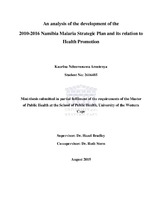| dc.description.abstract | Background: Malaria was a major cause of mortality and morbidity in Namibia from 1999 to 2001. Malaria epidemics were recorded in 1990, 1996, 2000 and in 2001. In 2001 alone 733, 509 malaria morbidity cases and 1,728 mortality cases were documented. In recent years, however, malaria morbidity and mortality in the country have drastically declined by over 90%. This has influenced the Ministry of Health and Social Services (MoHSS) in Namibia to adopt a malaria elimination approach as opposed to the malaria case management approach. A malaria programme, known as the National Vector Disease Control Program (NVDCP) was instituted and mandated to coordinate malaria case management (diagnosis and treatment) as well as the current malaria elimination focus (elimination of transmission foci). This is all aimed at effectively addressing the current malaria epidemiology and sustain the decline observed over the last decade. Aim and Methodology: The study’s purpose was to analyse how the Namibia Malaria Strategic Plan (MSP) for 2010-2016 was developed and its relationship to health promotion. It employed an exploratory design which included stakeholders involved in malaria programmes and activities in the country. Data collection methods were of a qualitative nature through in-depth interviews and documentary review. Seven people were interviewed representing stakeholders from the public and private sectors. Those interviewed from the public sector were the Ministry of Environment and Tourism (MET), MoHSS’s division for Malaria, Policy Planning and Information Education and Communication (IEC). Others interviewed included national and international non-governmental organizations’ representatives from the World Health Organisation (WHO) and Society for Family Health (SFH). Documents reviewed include MSP 2010-2016, MSP 2003-2007, Malaria Policy of 2005, National Health Promotion policy 2012 and the Namibian Constitution. Data was analysed using content and thematic processes. Respondents were assured of confidentiality and anonymity. Key findings: The study found that information with regard to the formulation process of the MSP 2010-2016 was limited to a few superficially described events. These events involved, amongst others, a review of the previous (2003-2007) MSP, a pre-assessment questionnaire and two to three
workshops. The events were not explicitly described or documented. The researcher concluded that the evidence to better understand the development processes of the MSP 2010-2016 was deficient. Consequently, the study concluded that the policy formulation aspects of the MSP were inadequate. The literature indicates that policy formulation and analysis is a complex undertaking and the MSP process did not meet these criteria. Amongst the limitations were limited stakeholder engagement and incomplete descriptions of the processes undertaken. In relation to the MSP’s focus on health promotion, the study found varied understanding of health promotion among the stakeholders. Some respondents were not aware of their organisation’s health promotion interventions while others believed that health promotion was limited to the health sector only. However, while national documents, such as the Namibian Constitution, advocate for ‘health investment as a just cause’ the MSPs limited inclusion of relevant stakeholders, such as the Ministry of Environment (MET) and the Information, Education and
Communication (IEC) unit, restricted the ability of the MSP to offer malaria expansive programmes – that is, those beyond the health realm. Moreover, the implementation of malaria activities through the involvement of a limited range of
actors in the malaria programmes will continue to perpetuate the existing narrow focus of health promotion by these stakeholders, as opposed to a more broad-base understanding. As a result malaria prevention will continue to be delivered as silo events or programmes. This poses serious implications in working towards the MSP goal of malaria elimination. Recommendations: The Ottawa Charter advocates for ‘Building healthy public policies’. This specifically refers to multi-disciplinary programmes. This study therefore recommends that the NVDCP follow existing
international and national guidelines which systematically guide the development of MSPs and official health documents. Doing so would enable a more streamlined policy development process which would describe and contextualize the dimension of policy formulation, namely context, content, process and actors. It also recommends that the MSP is developed through a broad-based collaborative stakeholder engagement process which would facilitate an appropriately integrated
inter-sectoral approach to malaria in the country. | en_US |

